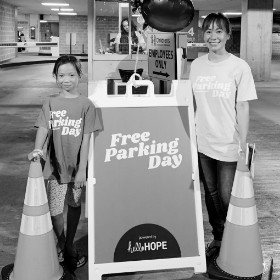How to Advocate for Your Child’s Medical Needs: A Physician’s Perspective
When your child is sick, it is easy to feel helpless and overwhelmed with the weight of a diagnosis. As parents, we want to make it all better, but it’s hard to know the best way to help. We recently had the opportunity to talk with Dr. Igor Shumskiy, a pediatric resident physician with Harvard Medical School, about ways that parents can advocate for their child and be involved with their care. His wisdom on having a posture of humility, asking questions, seeking the support you need, and believing the best gives incredible perspective. We are so thankful to Dr. Shumskiy for taking the time to share his insights with us. Here’s our conversation:
helloHOPE: What does it mean for a parent to be an advocate for their child?
Dr. Shumskiy: Being an advocate is varied and very different for different families. It also changes significantly if you’re talking about a child with a minor chronic illness, a limited chronic illness, or many significant chronic illnesses. What I’ve seen that works best for families is simply asking questions and being involved. Ask the physician, team, or nursing staff, “How can I learn more? How can I be helpful? How can I understand my child’s illness better and be more involved?” Usually that tends to work well, allowing the family to be a good advocate while also feeling like they are helping their child.
I also think parents are advocates in different ways. A parent who has no involvement in the treatment of the disease might be an advocate by saying, “I don’t want my child getting another IV or lab test because they’re not doing well today. I can see that they’re having a hard day.” I always respect that because that’s a parent who has a way of seeing their child’s needs. On the other side, parents who know the disease and have gotten second opinions can say, “Why are we doing this treatment rather than another treatment?” It’s a varied and wide spectrum for parents because every parent takes their child’s diagnosis differently and feels like they can be involved in a different way.
Be present. Be involved with team discussions. Try to learn a little bit and know it’s ok to ask questions. As the parent, you can ask questions, learn more, and make sure that your child is getting what they need.
HH: Are there any questions that you wished more parents asked?
Dr. Shumskiy: A couple come to mind. A good place to start would be to ask, “Is there a good place for me to learn more about this diagnosis?” Sometimes it’s hard for a physician to hear the question, “Can you explain everything to me in perfect detail?” That’s a reasonable question, and we will do our best to accommodate it, but time does not always allow it.
An even better question is, “Can you recommend some resources for me to learn about this?” There aren't many great references out there on the Internet, and there’s a lot of bad information and misinformation. As physicians, we often say, “Don’t just read everything on the Internet. Go to this particular website because we feel like it’s the most appropriate information.”
What I would always suggest to parents is read up on the situation, write down any questions, and then we can sit down and discuss what doesn’t make sense.
For parents of children who are in the intensive care unit with many chronic conditions and a longstanding problem, I would empower parents to ask, “Can we sit down and just discuss this?” The times that go well are when the parents come in with an open mind with no particular expectations – they just want to discuss and talk. There’s no blaming involved and no arguments. It’s a situation where we figure out as team – with the parents included in that team – how we can best care for the child.
It’s the duty of the team that you’re working with to make time for you to sit down and discuss what is being done, what isn’t being done, what different steps can we take, what other people are involved, who should not be part of the conversation, and so on, in more complex situations.
HH: How do you approach a situation when a parent is considering getting a second opinion on their child’s condition?
Dr. Shumskiy: You think about any other industry, and a second opinion is standard, right? It’s not a faux pas. In medicine, for some reason, we can look at a second opinion as a faux pas, almost as “we failed,” and that’s not the right way to look at it at all.
Really, a second opinion is, I believe, the right of every patient and every caregiver, and it’s very reasonable to say to the team and to the physician, “I really trust your care. I appreciate everything you’re doing. Is there any way you can help me get a second opinion so that I can feel comfortable that I’ve done everything for my child?” So many times, that is why a second opinion is requested. I don’t think a second opinion is done because people don’t trust the first opinion. It’s more of, “How can I make a decision to give my child chemotherapy,” for example, “if I haven’t talked to more than one person?”
That’s a very reasonable thought and should be respected. Maybe it’s not necessary in more basic situations, but I always empower the family to discuss it and bring it up if that’s something that they feel is important to them. What I’ve seen is that if the physician and the team are supportive of that request and help with the second opinion, maybe even set up that second opinion if the parent prefers, the process actually builds a better bond. The best physicians I’ve seen have done that with grace.
HH: How have you seen families balance the desire to learn more about their child’s diagnosis with feeling overwhelmed or fearful about what was ahead?
Dr. Shumskiy: My recommendation would be to use support systems. Most situations where I've seen things go very well for families from an emotional standpoint, is when families are optimistic. They have good support systems. That might be turning to religion, that might be turning to family, that might be turning to support systems like what you’re building with helloHOPE. They support each other, particularly the parents or the grandparents or the aunts and uncles support each other and do their best to support the patient. No matter what the statistics are, what the avenues are, which way the diagnosis could go, the family usually does well in response to it.
With longstanding chronic illness, I always advocate for palliative care to be involved if the situation is right. If families are in a situation where they need to make decisions ranging from medication changes and coping with chronic illness to end of life decisions, palliative care teams can be great. They make sure that the family’s wishes are discussed, that everyone understands the family’s wishes, and they provide helpful recommendations.
Dr. Shumskiy gave some steps for finding helpful resources:
Since every hospital is different, asking for help is the first step.
Use a palliative care team and child life if you have it.
According to Dr. Shumskiy, social workers are “basically angels” and a great help.
Ask the specialist physician if there are specific resources they would recommend. They may know of specific camps or groups.
Associations and foundations may have more respected information about a medical diagnosis.
HH: Any additional thoughts to encourage families?
Dr. Shumskiy: Walking through a medical diagnosis is very difficult, and it’s not something families are trained for. It can rock the core of the family and put strains on the family that no one ever expected. Know there are going to be difficult days, and that’s ok. There’s going to be a lot of stress, but don’t internalize it and let the stress fester. Look for support. Access those helpful resources. Remember that you are not alone.
—
Dr. Shumskiy’s opinions are his alone and are not representative of Harvard Medical School or Boston Medical Center. As always, consult your child’s physician about any questions, treatment advice, or resources.
You may also be interested in our article, "How to Ask for Help When Challenges Come."













